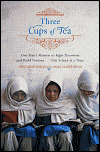Friday, April 07, 2006
THREE CUPS OF TEA by Greg Mortenson
 Greg Mortenson and David Oliver Relin, Three Cups of Tea: One Man's Mission to Fight Terror and Build Nations--One School at a Time (Viking, 2005):
Greg Mortenson and David Oliver Relin, Three Cups of Tea: One Man's Mission to Fight Terror and Build Nations--One School at a Time (Viking, 2005):Imagine yourself lost and alone on top of a glacier near Pakistan's K2, the world's most dangerous mountain. You have no supplies. After a frigid night's rest, you manage to find the trail back to the village where your porter and climbing team are waiting. On the way, you get lost again and end up in another village, Korphe. Very hospitable people greet you there. They nurse you back to health. To show your gratitude, you promise to build them a much needed school. But how will you keep your promise when you have little money and know nothing about building schools?
So begins the story of Greg Mortenson, a remarkable mountain climber-turned-humanitarian. Mortenson not only keeps his promise to the people of Korphe but goes on to build another 54 schools in Pakistan and Afghanistan, many of them for girls. Along the way, he struggles against religious fundamentalism and learns to respect the ways of the locals he seeks to help. He was instructed to do the latter by Haji Ali, his host in Korphe:
" 'If you want to thrive in Baltistan, you must respect our ways....The first time you share tea with a Balti, you are a stranger. The second time you take tea, you are an honored guest. The third time you share a cup of tea, you become family, and for our family, we are prepared to do anything, even die,' he said, laying his hand warmly on Mortenson's own. 'Doctor Greg, you must make time to share three cups of tea. We may be uneducated. But we are not stupid. We have lived and survived here for a long time.' " (p. 150)
For those unfamiliar with mountain climbing or the political and social terrain of Pakistan and Afghanistan (like me), THREE CUPS OF TEA may prove to be a dense read. It is worth the effort though. I remembered super librarian Nancy Pearl's advice to give a book at least fifty pages before casting it aside. By page 51, I was hooked.
Learn more about Greg Mortenson's humanitarian efforts at the website for the Central Asia Institute, which he founded.
Also about Afghanistan:
[Nonfiction] Christina Lamb, Sewing Circles of Herat: A Personal Voyage through Afghanistan (HarperCollins, 2005).
[Fiction] Khaled Hosseini, The Kite Runner (Riverhead Books, 2003).
Doris Dixon, Raleigh Branch Library
Labels: Reviews by Doris Dixon


